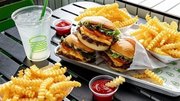Article
Fast casuals opt for interaction
Self-service technology finds little support from fast-casual operators.

January 21, 2008
As the quick-service segment rushes to embrace the speed and convenience provided by self-service technology, fast-casual restaurants have been largely resistant.
Companies such as Au Bon Pain pride themselves on their personal interaction with customers, and while a kiosk-ordering system would cut service time in half and reduce costly manpower, they question whether the loss of that human touch would be worth it.
Ed Frechette, vice president of marketing for Au Bon Pain, said the company toyed with the idea of implementing a kiosk that would take a customer's order and payment but ultimately decided against it.
"This process of interacting with the sandwich maker is warmer and hospitality is a big thing we do at Au Bon Pain," Frechette said. "We like the human interaction part, so we're a little reticent about jumping into a full technological process."
Au Bon Pain is not an anti-self-service establishment. Guests serve themselves everything from soup to bread and beverages, and they use pads to create customized sandwich orders that they hand to the cooks behind the line. But the business model of Au Bon Pain also calls for having an employee on the floor at all times to interact with customers.
"A lot of places would say that person isn't adding any value so cut him off the payroll," Frechette said. "But, for us, that human interaction is very important. We haven't figured whether technology is going to add value to the experience or not. Right now, we're trying to figure out how to optimize the flow through our cafés, but technology may not be a part of that."
Au Bon Pain is just one of many fast-casual restaurants struggling with the concept of self-service technology.
Café Express, offering Southwest cuisine in Dallas and Houston, prides itself on "no waiters, no tipping, no hassles." Customers order from a cashier and pick up their own food. The chain is not averse to self-service, but it will go only so far, said marketing coordinator Leah Taylor.
"I think customers need that interaction from the service end, and I don't think a lot of our customers would be happy if we eliminated that with technology," she said. "People have a routine and having a change like that would really need to be tested before we ran something like that."
The customer experience
Brian Darr, managing director of Datassential Research in Chicago, said the quick-service segment is flocking to new self-service technologies because it helps turn customers faster. But lost in the process is customer interaction, the cornerstone of fast-casual restaurants.
"Some fast-casual places think that even doing things like self-serve soft drinks is about as far as they want to go," Darr said. "It's all part of the concept of delivering fresh food and the whole cornerstone of the fast-casual experience is that they prepare food customized and it's considered fresh. But these kiosks that allow you to order a sandwich any way you want it, I think that will be the first thing they look at. I think they'll experiment with that."
Aaron Allen, CEO of Quantified Marketing Group, said self-service technology is immediately adaptable to quick-service chains because it is created with them in mind.
| ||||||||||||||||||||||
The tech providers want the largest possible rollout of their product and the best way to ensure that is to create something perfectly suited for McDonald's or Burger King. But eventually the technology will take hold of the fast-casual restaurants, despite their initial resistance, Allen said.
"They say they want to keep that human interaction, but that's just the romantic version of it," he said. "I think a lot of fast-casual CEOs would say that's why they're not using a lot of this self-service technology, but it's no different than hotels 15 years ago saying they didn't want to automate the reservation process. Eventually they did, and consumers like it more and find it a more rewarding service. And it didn't make the hospitality environment cold."
Technology puts service on the consumer's terms, Allen said.
"One thing you can never do too much of in business is make it too easy to buy from you and that's what self-service technology allows," he said.













